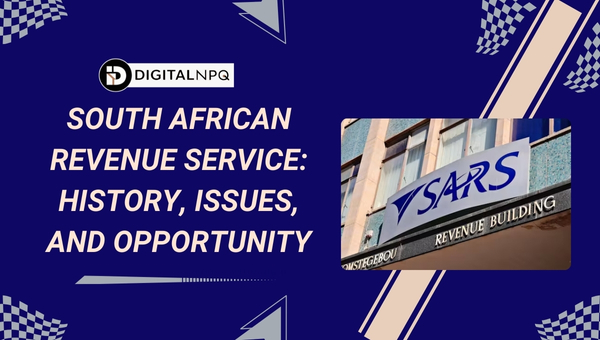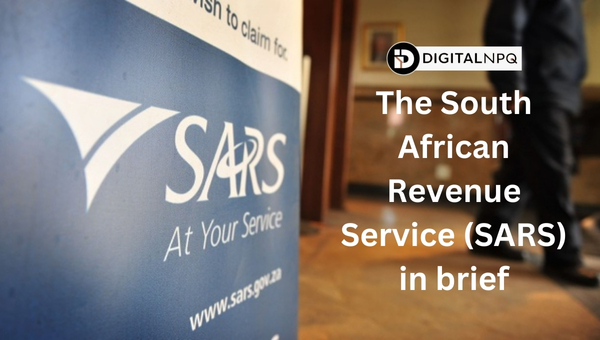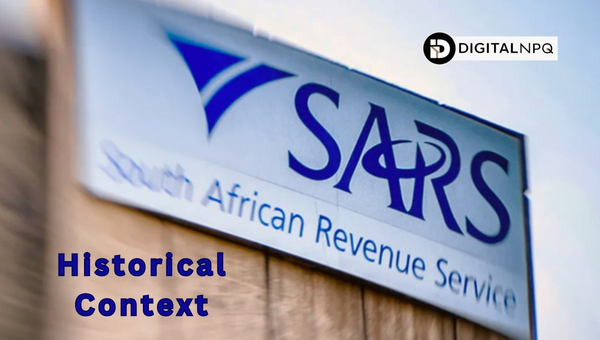South African Revenue Service: History, Issues, and Opportunity

The South African Revenue Service (SARS) plays a vital role in the nation’s economy. In this article, we’ll explore the historical context of SARS, key issues and controversies it has faced, and its organizational structure.
We’ll also dive into job opportunities within SARS. By understanding these aspects, you’ll gain valuable insights into how SARS functions and its impact on South Africa.
Essentials of the South African Revenue Service (SARS)
The South African Revenue Service (SARS) is the government agency responsible for tax collection and customs administration in South Africa.

Established on October 1, 1997, SARS aims to ensure compliance with tax legislation and facilitate trade while protecting the economy. It operates under the policy direction of the Minister of Finance and boasts a significant degree of autonomy.
Historical Context of South African Revenue
The South African Revenue Service (SARS) has undergone significant transformations since its inception. Understanding the historical context of SARS gives insights into how it has evolved to meet the demands of a dynamic economic environment. Let’s delve into the pivotal periods of its development.

Mandela and Mbeki Presidencies
During the presidencies of Nelson Mandela and Thabo Mbeki, SARS was established and saw considerable progress. The agency was created in 1997, aiming to build a more efficient and transparent tax system in the post-apartheid era.
Under the leadership of Pravin Gordhan, who served as Commissioner from 1999 to 2009, SARS gained a reputation for its effectiveness. Tax revenue saw a significant increase, and the agency implemented modern tax administration practices.
This period marked a crucial phase in building a robust customs service, enhancing taxpayer compliance, and ensuring the integrity of the tax system.
Ramaphosa Presidency
Under President Cyril Ramaphosa, SARS has experienced substantial reforms. Appointing Edward Kieswetter as Commissioner in May 2019 was a key move to revitalize the agency. This era focused on restoring public trust and addressing previous mismanagement issues.
The reforms under Ramaphosa’s leadership emphasized transparency, accountability, and operational efficiency. Efforts were made to improve taxpayer services and strengthen compliance measures. These changes aimed to rebuild SARS into a functional and respected institution, ensuring it meets the modern challenges of tax administration effectively.
Key Issues and Controversies
The South African Revenue Service (SARS) has faced several critical issues and controversies over the years. These incidents have significantly impacted its operations and public perception. Let’s delve into some of the prominent controversies that have shaped SARS.

State Capture Revelations
State capture revelations have deeply affected SARS, especially between 2014 and 2018. During this period, political interference undermined the agency’s capabilities. The Nugent Commission investigated these claims, revealing that SARS was manipulated for personal and political gain.
This manipulation led to a decline in tax collection and operational effectiveness. The commission’s findings highlighted the need for reforms to restore public trust in SARS.
Rogue Unit Allegations
The rogue unit allegations emerged during Tom Moyane’s tenure as Commissioner. This unit was accused of conducting unlawful surveillance and operating outside legal boundaries. The controversy raised significant governance and accountability concerns within SARS.
These allegations led to calls for thorough investigations and reforms to ensure such incidents do not recur, emphasizing the need for transparency and integrity.
Involvement of Bain & Company
Bain & Company’s involvement with SARS during its restructuring process has been highly controversial. The consulting firm was accused of contributing to the dismantling of SARS’s operational capabilities.
Investigations revealed that Bain’s recommendations were aligned with the interests of certain political figures, exacerbating the agency’s decline during the state capture era. This controversy highlighted the risks of external influences on critical governmental agencies.
Allegations Against Pravin Gordhan
Pravin Gordhan, who served as Commissioner of SARS before his tenure as Minister of Finance, faced allegations related to his time at the agency. Critics accused him of fostering an environment that allowed the rogue unit to operate.
Although Gordhan has consistently denied these claims, the allegations sparked debates about accountability and governance within SARS. These debates reflect broader issues of political influence in South Africa’s institutions.
These key issues and controversies have profoundly impacted SARS, underscoring the importance of transparency, accountability, and effective governance in public institutions.
Also Read: $1800 Social Security Payment: What You Need to Know?
Organizational Structure Of South African Revenue
The South African Revenue Service (SARS) has a well-defined organizational structure to ensure efficient tax collection and compliance.
The structure comprises various key personnel who play important roles in different departments. Let’s delve into the main roles and responsibilities within SARS.
Key Personnel
The effectiveness of SARS heavily relies on the expertise and dedication of its key personnel. Each role is critical in ensuring that SARS meets its objectives and serves the public efficiently.
Commissioner
The Commissioner of SARS is pivotal in shaping the agency’s policies and overall direction. This role includes:
- Overseeing tax collection and compliance enforcement.
- Setting strategic goals and ensuring they are met.
- Representing SARS at national and international levels. The Commissioner, appointed by the President, is central to maintaining the integrity and efficiency of SARS.
Office Manager
Office Managers play a crucial role in the day-to-day operations of SARS. Their responsibilities include:
- Managing departmental staff and resources.
- Ensuring compliance with internal and external regulations.
- Implementing policies set by the Commissioner. These managers ensure that the operations run smoothly and efficiently, directly impacting the agency’s effectiveness.
Spokesperson
The Spokesperson for SARS is essential in maintaining transparent communication with the public. Their duties involve:
- Communicating policies and updates to the public.
- Addressing challenges and successes of SARS.
- Ensuring public understanding and trust in SARS activities. This role helps bridge the gap between the agency and the public, fostering trust and transparency.
Information Officers
Information Officers are responsible for managing data and taxpayer interactions. Their tasks include:
- Ensuring data accuracy and compliance.
- Facilitating smooth interactions with taxpayers.
- Supporting the implementation of SARS policies. These officers are vital in maintaining accurate records and ensuring that taxpayers are well-informed and compliant.
Each of these roles contributes significantly to the overall mission of SARS, ensuring that the agency operates efficiently and effectively.
Also Read: How the Cost of Living Wage Increase 2024 Impacts You!
Job Opportunities
The South African Revenue Service (SARS) offers a range of job opportunities for individuals looking to contribute to the country’s tax system and customs service. With positions available across various departments, SARS seeks to attract skilled professionals eager to enhance the agency’s effectiveness.
Whether you’re interested in tax administration, compliance, or customer service, there are numerous roles that cater to diverse skill sets. By joining SARS, you’ll be part of a team dedicated to improving tax collection and facilitating legitimate trade. To find out more about these opportunities, you can visit the SARS website or contact their offices directly.
Contact Information
For those interested in applying for job opportunities at SARS, you can reach out through the following contact details:
- Postal Address: Private Bag X923, Pretoria, 0001
- Physical Address: Lehae La Sars Building, 299 Bronkhorst Street, Nieuw Muckleneuk, Brooklyn, 0181
- Telephone: 012 422 4000
- Website: www.sars.gov.za
Feel free to explore the SARS website for current vacancies and detailed application procedures.
FAQs
What does a revenue service do?
A revenue service is responsible for collecting taxes from individuals and businesses. It ensures compliance with tax laws and regulations to fund public services and infrastructure.
What does SARS do?
The South African Revenue Service (SARS) administers the country’s tax system and customs service. It collects taxes, enforces tax legislation, and facilitates legitimate trade while protecting the economy.
How do I contact SARS?
You can contact SARS via their official website, by phone at 012 422 4000, or by visiting their offices at Lehae La Sars Building, 299 Bronkhorst Street, Nieuw Muckleneuk, Brooklyn, Pretoria.
Conclusion
The South African Revenue Service (SARS) plays a pivotal role in ensuring the financial health and compliance of the nation. From its establishment to the present day, SARS has seen significant changes and faced numerous challenges.
Understanding its historical context, key issues, organizational structure, and job opportunities provides valuable insights into its operations. As SARS continues to evolve, staying informed about its developments is crucial for taxpayers and professionals alike.
If you found this article helpful, explore more on our site for in-depth analyses and updates on similar topics. Stay informed and empowered!
